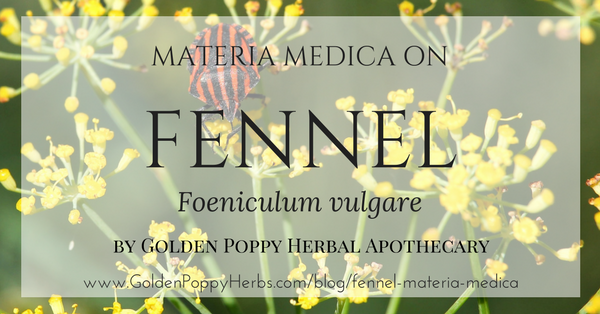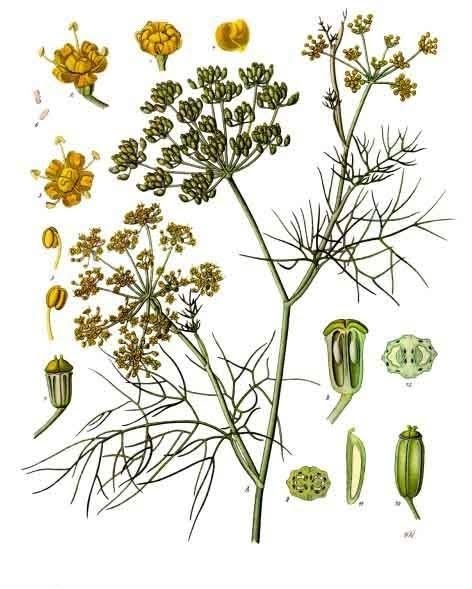
If you've ever eaten at an Indian food restaurant and grabbed a little spoonful of candy-coated seeds on your way out the door then you are likely familiar with fennel. This wonderful little spice is common in Indian food restaurants, and for a good reason.
Fennel is an herb that most people are probably familiar with, it tastes like what most people think licorice tastes like because it is often used in licorice candy to enhance the flavor.
Its power as a digestive herb comes from its ability to lessen the “I ate too much” feeling that sometimes happens when indulging in good food. It is also particularly helpful in assisting the body to break down meals that are higher in fats, such as dishes that contain lots of cream and butter (Like Chicken Tika Masala....)
It is a mildly cooling herb which means it is beneficial for hot digestive conditions such as heartburn and bloating. Taken before a meal it can help to prep the body for digestion; taken after a meal it can help your body break down the foods better so that you are able to assimilate the nutrients more easily.
In addition toitss digestive aspects, fennel is also commonly used in formulas to help increase breast milk production for nursing mothers. We prefer a tea for this application as this also helps to increase mom’s liquid intake. Drinking fennel tea can also help to improve baby’s digestion, particularly if they are prone to colic.
Fennel tea is safe enough for people of all ages, and a washcloth soaked in fennel tea can be given to babies to suck on for a more direct application.
Anytime you are feeling like you overate, have heartburn, need to freshen your breath after eating lots of garlic and onions, or are looking to soothe an upset tummy, grab a handful of these little seeds and munch away.

MATERIA MEDICA: FENNEL
Latin Name:
Foeniculum vulgare
Family: Umbelliferae
TCM Name: Xiao hui xiang
Ayurvedic Name: Saunf or Variyali or Shatapushpa
Botanical Description:
A tall perennial with a thick root stock and fleshy, hollow stems, fennel can grow as high as 4 to 5 feet. It has feathery, finely-divided linear foliage on clasping leafstalks and bears yellow, flat compound umbels with 20-50 yellow flowers in July and August. In late summer, fennel produces a profusion of green-gray fruits with a characteristic anise-like taste and aroma. The seed is grooved. (
Herbarium)
Part used:
Seeds (the root is also used in culinary creations)
Harvesting Guidelines:
Unlike garden fennel, wild fennel has a woody, unpalatable root. However, wild fennel’s feathery fronds can be harvested by clipping them from the stem and can be added to salads or used to make tea. To harvest fennel seeds, look for mature flower heads on a warm afternoon. Wild seeds will be smaller, darker, and more irregular than seeds from cultivated varieties of fennel. Clip off the flower head and pinch off seeds while still green. (
Herbarium)
Energetics: Mildly cooling, moist, sweet
Actions:
- Anti-emetic
- anti-inflammatory
- antispasmodic
- anti-tussive
- aromatic
- calmative
- carminative
- digestive
- expectorant
- galactagogue
- mucolytic
- stomachic
Uses:
- Enhances the digestion and assimilation of food
- Improves digestion of fatty foods
- Relaxes the digestive tract in cases of griping
- Helps relieve the feeling of having overeaten
- Clears phlegm, and relaxes the bronchi making it excellent for calming coughs
- Can help increase breast milk production
- Is soothing to mucus membranes which is helpful for dry coughs
- Can also be made into a tea and used to soothe irritated eyes (*must be strained very well before use)
Preparation and Dosage
-
Tea - 1-2 tsp. in 8-10 oz hot water, allow to steep for 15-25 minutes.
-
Tincture - 20-60 drops three times/day.
Safety considerations:
Can be over-stimulating if used excessively.
Although concerns over the toxicity of one fennel’s key constituents—estragole—have been raised, fennel is generally considered a safe and gentle herb. Because of its estrogenic effects, the use of fennel is not recommended during pregnancy. In rare cases, fennel has been known to cause allergic reactions affecting the skin and the respiratory system. (
Herbarium)
 If you've ever eaten at an Indian food restaurant and grabbed a little spoonful of candy-coated seeds on your way out the door then you are likely familiar with fennel. This wonderful little spice is common in Indian food restaurants, and for a good reason.
Fennel is an herb that most people are probably familiar with, it tastes like what most people think licorice tastes like because it is often used in licorice candy to enhance the flavor.
Its power as a digestive herb comes from its ability to lessen the “I ate too much” feeling that sometimes happens when indulging in good food. It is also particularly helpful in assisting the body to break down meals that are higher in fats, such as dishes that contain lots of cream and butter (Like Chicken Tika Masala....)
It is a mildly cooling herb which means it is beneficial for hot digestive conditions such as heartburn and bloating. Taken before a meal it can help to prep the body for digestion; taken after a meal it can help your body break down the foods better so that you are able to assimilate the nutrients more easily.
In addition toitss digestive aspects, fennel is also commonly used in formulas to help increase breast milk production for nursing mothers. We prefer a tea for this application as this also helps to increase mom’s liquid intake. Drinking fennel tea can also help to improve baby’s digestion, particularly if they are prone to colic.
Fennel tea is safe enough for people of all ages, and a washcloth soaked in fennel tea can be given to babies to suck on for a more direct application.
Anytime you are feeling like you overate, have heartburn, need to freshen your breath after eating lots of garlic and onions, or are looking to soothe an upset tummy, grab a handful of these little seeds and munch away.
If you've ever eaten at an Indian food restaurant and grabbed a little spoonful of candy-coated seeds on your way out the door then you are likely familiar with fennel. This wonderful little spice is common in Indian food restaurants, and for a good reason.
Fennel is an herb that most people are probably familiar with, it tastes like what most people think licorice tastes like because it is often used in licorice candy to enhance the flavor.
Its power as a digestive herb comes from its ability to lessen the “I ate too much” feeling that sometimes happens when indulging in good food. It is also particularly helpful in assisting the body to break down meals that are higher in fats, such as dishes that contain lots of cream and butter (Like Chicken Tika Masala....)
It is a mildly cooling herb which means it is beneficial for hot digestive conditions such as heartburn and bloating. Taken before a meal it can help to prep the body for digestion; taken after a meal it can help your body break down the foods better so that you are able to assimilate the nutrients more easily.
In addition toitss digestive aspects, fennel is also commonly used in formulas to help increase breast milk production for nursing mothers. We prefer a tea for this application as this also helps to increase mom’s liquid intake. Drinking fennel tea can also help to improve baby’s digestion, particularly if they are prone to colic.
Fennel tea is safe enough for people of all ages, and a washcloth soaked in fennel tea can be given to babies to suck on for a more direct application.
Anytime you are feeling like you overate, have heartburn, need to freshen your breath after eating lots of garlic and onions, or are looking to soothe an upset tummy, grab a handful of these little seeds and munch away.




